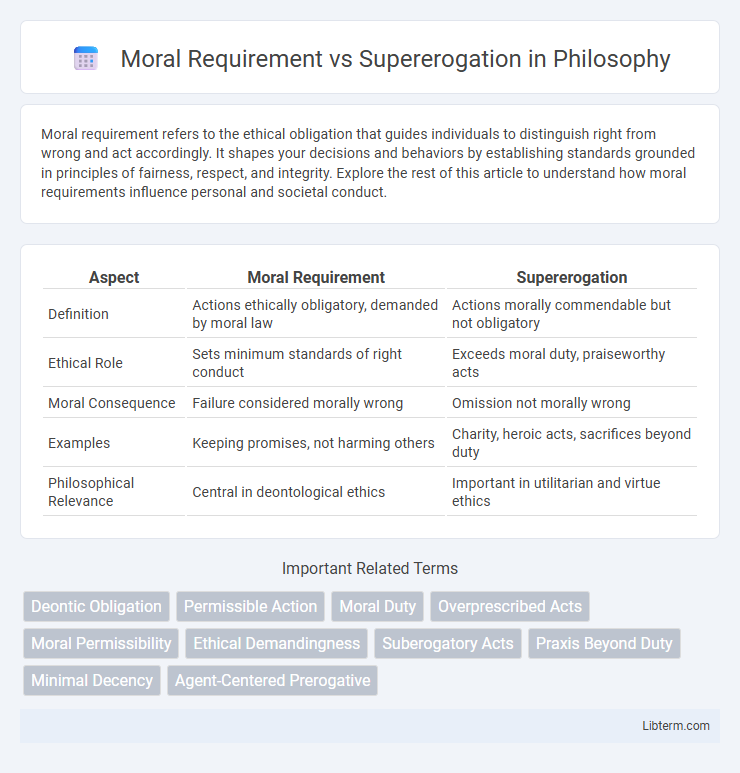Moral requirement refers to the ethical obligation that guides individuals to distinguish right from wrong and act accordingly. It shapes your decisions and behaviors by establishing standards grounded in principles of fairness, respect, and integrity. Explore the rest of this article to understand how moral requirements influence personal and societal conduct.
Table of Comparison
| Aspect | Moral Requirement | Supererogation |
|---|---|---|
| Definition | Actions ethically obligatory, demanded by moral law | Actions morally commendable but not obligatory |
| Ethical Role | Sets minimum standards of right conduct | Exceeds moral duty, praiseworthy acts |
| Moral Consequence | Failure considered morally wrong | Omission not morally wrong |
| Examples | Keeping promises, not harming others | Charity, heroic acts, sacrifices beyond duty |
| Philosophical Relevance | Central in deontological ethics | Important in utilitarian and virtue ethics |
Defining Moral Requirements
Moral requirements are obligations that individuals must follow to act ethically, encompassing duties such as honesty, justice, and respect for others. These duties are typically seen as necessary for maintaining social order and moral integrity, forming the foundation of ethical behavior. Unlike supererogatory acts, which go beyond moral duty and are praiseworthy but not obligatory, moral requirements are compulsory actions essential to moral conduct.
Understanding Supererogation
Supererogation refers to actions that go beyond moral duty, offering moral praise without obligation, such as charity or heroic acts. Understanding supererogation clarifies how some ethical behaviors exceed the baseline requirements set by moral obligations. This distinction helps differentiate between what is morally required and what is morally commendable but not mandatory.
Key Differences Between Duty and Supererogation
Moral requirements are obligations that individuals must fulfill, such as telling the truth or refraining from harm, establishing a baseline for ethical behavior. Supererogation refers to actions that go beyond moral duty, like donating a significant portion of income to charity, which are commendable but not compulsory. The key difference lies in duty being mandatory for moral integrity, while supererogatory acts are voluntary and praiseworthy yet not required.
Historical Perspectives on Moral Obligations
Historical perspectives on moral obligations reveal a complex evolution distinguishing moral requirements from supererogation. Classical philosophers like Aristotle emphasized virtues as moral necessities, while later thinkers such as Kant introduced strict categorical imperatives defining obligatory actions. The development of supererogation emerged prominently in medieval scholasticism, where theologians argued that certain virtuous acts exceed moral duty, highlighting the fluctuating boundaries of ethical obligations across time.
Philosophical Theories of Supererogatory Acts
Philosophical theories of supererogatory acts explore actions that go beyond moral requirements, emphasizing deeds that are praiseworthy but not obligatory. Supererogation challenges deontological ethics by introducing a category of acts that are morally good but not demanded, contrasting with moral requirements that establish baseline duties such as Kantian imperatives or utilitarian obligations. Theories by philosophers like Jonathan Dancy and William James analyze how supererogatory acts expand moral reasoning by accounting for voluntary generosity and heroism without imposing moral guilt for omission.
The Role of Moral Requirements in Society
Moral requirements establish the baseline obligations that individuals must follow to maintain social order and promote fairness within communities. These duties, such as honesty, justice, and respecting others' rights, form the foundation for trust and cooperation in society. Supererogatory acts exceed these moral obligations, often inspiring moral progress but not undermining the essential role that moral requirements play in shaping ethical behavior and social cohesion.
Examples of Supererogatory Actions
Supererogatory actions exceed moral requirements by going beyond what is ethically obligatory, such as donating a significant portion of one's income to charity or risking oneself to save a stranger from danger. These acts are praiseworthy but not demanded by moral duty, distinguishing them from obligatory actions like telling the truth or keeping promises. Examples of supererogatory behavior include volunteering extensive time for disaster relief or adopting environmentally sustainable practices without legal mandates.
Debates on the Scope of Moral Duty
Debates on the scope of moral duty center around whether moral requirements encompass only obligatory actions or also include supererogatory acts that go beyond duty. Some ethical theories argue that moral duty strictly involves actions all agents must perform, while others maintain that supererogation represents praiseworthy but non-compulsory conduct. This distinction significantly influences discussions on moral responsibility, normative ethics, and the delineation of obligatory versus optional moral behavior.
Practical Implications for Ethical Decision-Making
Moral requirements establish the baseline of actions individuals must take to fulfill ethical obligations, whereas supererogation refers to voluntary, commendable actions that go beyond these obligations. In practical decision-making, distinguishing between required duties and supererogatory acts helps clarify when one is morally obligated versus when one is performing admirable but optional actions. This distinction influences resource allocation, accountability, and the evaluation of ethical responsibility in contexts such as professional conduct and social justice initiatives.
Balancing Obligation and Altruism
Moral requirement defines actions obligatory to uphold ethical standards, while supererogation represents commendable but non-required acts exceeding duty. Balancing obligation and altruism involves discerning when actions shift from moral necessity to voluntary generosity, ensuring ethical behavior aligns with personal and societal welfare. This balance promotes a coherent moral framework that encourages both responsibility and exceptional kindness.
Moral Requirement Infographic

 libterm.com
libterm.com